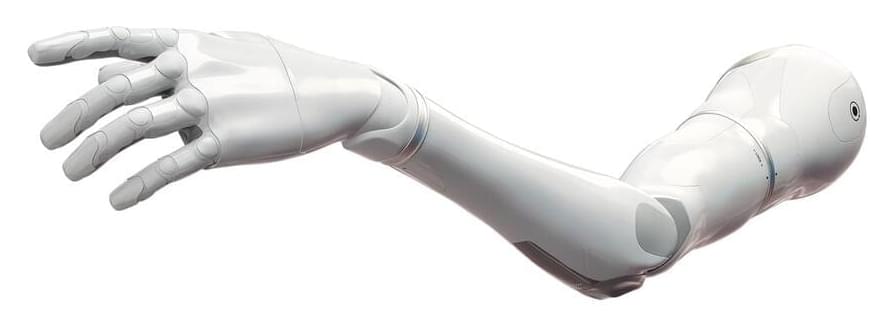
Category: cyborgs – Page 57


Bulletproof Chainmail: Scientists Created Flexible Fabric That Stiffens On Demand
Engineers at California Institute of Technology (Caltech) and the Nanyang Technological University (NTU) in Singapore teamed up to develop a chain mail-inspired fabric that transforms from a fluid malleable material into a solid protective material when under pressure, a press statement reveals.
The material could be used for a host of potentially lifechanging applications, including as smart fabric for exoskeletons, for a cast that becomes more or less rigid when needed to facilitate the healing of an injury, and as a deployable bridge that could be thrown over an obstacle and stiffened so that people can walk across with ease.

Peter 2.0: The Human Cyborg
This talks about an almost fully cyborg person and overcoming his illness.
The incredible book behind the primetime Channel 4 documentary, Peter: The Human Cyborg
‘A remarkable account of what it means to be human and what technology can really achieve’ Sunday Telegraph ’Peter’s story is one of the most extraordinary you will ever hear. I urge people to read it’ Stephen Fry.
‘A remarkable story… ou’re left desperate to take nothing for granted’ Radio Times __________.

British man given 3D printed eye in world first, hospital says
(CNN) — A British man has become the first patient in the world to be fitted with a 3D printed eye, according to Moorfields Eye Hospital in London.
Steve Verze, who is 47 and an engineer from Hackney, east London, was given the left eye on Thursday and first tried it for size earlier this month.
Moorfields Eye Hospital said in a press release Thursday that the prosthetic is the first fully digital prosthetic eye created for a patient.

Stretchable pressure sensor could lead to better robotics, prosthetics
In the future, soft robotic hands with advanced sensors could help diagnose and care for patients or act as more lifelike prostheses.
But one roadblock to encoding soft robotic hands with human-like sensing capabilities and dexterity has been the stretchability of pressure sensors. Although pressure sensors—needed for a robotic hand to grasp and pick up an object, or even take a pulse from a wrist—have been able to bend or stretch, their performance has been significantly affected by such movement.
Researchers at the Pritzker School of Molecular Engineering (PME) at the University of Chicago have found a way to address this issue and have designed a new pressure sensor that can be stretched up to 50 percent while maintaining almost the same sensing performance. It is also sensitive enough to sense the pressure of a small piece of paper, and it can respond to pressures almost instantaneously.
Cyborgs, Androids, Transhumanism & AI
This series looks at concepts such as Artificial Intelligence, Transhumanism, Cybernetics, Androids, Robots, and Augmenting the human or animal mind.
Dr Patrick van der Smagt, Director, ArtificiaI Intelligence Research, Volkswagen AG — Head Argmax.AI
Fundamental Research On Ethical & Trustworthy Artificial Intelligence, For Health, Environment, And A Sustainable Future — Dr. Patrick van der Smagt, Ph.D., Director, ArtificiaI Intelligence Research, Volkswagen.
Dr. Patrick van der Smagt is Director of ArtificiaI Intelligence Research, Volkswagen AG, and Head of Argmax. AI (https://argmax.ai/), the Volkswagen Group Machine Learning Research Lab, in Munich, focusing on a range of research domains, including probabilistic deep learning for time series modelling, optimal control, reinforcement learning robotics, and quantum machine learning.
Dr. van der Smagt is also a research professor in the Computer Science faculty at Eötvös Loránd University in Budapest.
Dr. van der Smagt previously directed a lab as professor for machine learning and biomimetic robotics at the Technical University of Munich while leading the machine learning group at the research institute fortiss, and before that, founded and headed the Assistive Robotics and Bionics Lab at DLR, the German Aerospace Center.
Besides publishing numerous papers and patents on machine learning, robotics, and motor control, Dr. van der Smagt has won a number of awards, including the 2013 Helmholtz-Association Erwin Schrödinger Award, the 2014 King-Sun Fu Memorial Award, the 2013 Harvard Medical School/MGH Martin Research Prize, the 2018 Webit Best Implementation of AI Award, and best-paper awards at various machine learning and robotics conferences and journals.
Every Prototype that Led to a Realistic Prosthetic Arm
Since the early 2000s, private companies, governments, and research labs have been developing prosthesis that are a lot more advanced than previous designs. WIRED talked with Easton LaChapelle, founder and CEO of Unlimited Tomorrow, to understand how he designed, tested, and adopted his prosthetic arm.
The movie GENERATION IMPACT: THE INVENTOR, follows 25-year old innovator Easton LaChappelle, who developed the world’s lightest weight and most affordable bionic limb. GENERATION IMPACT: THE INVENTOR, can be viewed on HP.com’s digital hub, the Garage (http://hp.com/generation-impact) and YouTube.
Still haven’t subscribed to WIRED on YouTube? ►► http://wrd.cm/15fP7B7
Listen to the Get WIRED podcast ►► https://link.chtbl.com/wired-ytc-desc.
Want more WIRED? Get the magazine ►► https://subscribe.wired.com/subscribe/splits/wired/WIR_YouTu…ription_ZZ
Follow WIRED:
Instagram ►►https://instagram.com/wired.
Twitter ►►http://www.twitter.com/wired.
Facebook ►►https://www.facebook.com/wired.
Get more incredible stories on science and tech with our daily newsletter: https://wrd.cm/DailyYT
Mansoor Hanif — Executive Director, Emerging Technologies, NEOM — An Accelerator Of Human Progress
A US$500 billion accelerator of human progress — mansoor hanif, executive director, emerging technologies, NEOM.
Mansoor Hanif is the Executive Director of Emerging Technologies at NEOM (https://www.neom.com/en-us), a fascinating $500 billion planned cognitive city” & tourist destination, located in north west Saudi Arabia, where he is responsible for all R&D activities for the Technology & Digital sector, including space technologies, advanced robotics, human-machine interfaces, sustainable infrastructure, digital master plans, digital experience platforms and mixed reality. He also leads NEOM’s collaborative research activities with local and global universities and research institutions, as well as manages the team developing world-leading Regulations for Communications and Connectivity.
Prior to this role, Mr Hanif served as Executive Director, Technology & Digital Infrastructure, where he oversaw the design and implementation of NEOM’s fixed, mobile, satellite and sub-sea networks.
An industry leader, Mr Hanif has over 25 years of experience in planning, building, optimizing and operating mobile networks around the world. He is patron of the Institute of Telecommunications Professionals (ITP), a member of the Steering Board of the UK5G Innovation Network, and on the Advisory Boards of the Satellite Applications Catapult and University College London (UCL) Electrical and Electronic Engineering Dept.
Prior to joining NEOM, Mr Hanif was Chief Technology Officer of Ofcom, the UK telecoms and media regulator, where he oversaw the security and resilience of the nation’s networks.